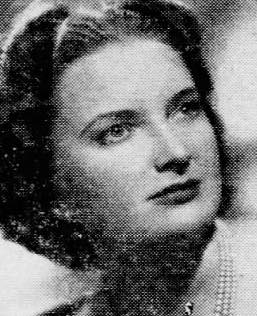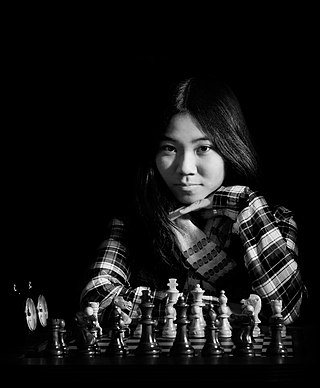
Elaine Guthrie Lorillard was an American socialite who founded the Newport Jazz Festival with her husband, Louis Lorillard.
Mary Tucker Thorp (1899–1974) was a teacher, educator and school principal at the Rhode Island College. She chaired the committee which investigated and made recommendations for accreditation standards for preschool education and which were adopted in the State Board of Education Codes in 1954. She was the first Distinguished Professor of Rhode Island College and both the first residence hall and a Professorship at the school are named in her honor. She was inducted into the Rhode Island Heritage Hall of Fame in 1969.

The Northeastern Federation of Colored Women's Clubs (NFCWC) is an umbrella organization representing black women's clubs in the northeastern United States. The organization was affiliated with the National Association of Colored Women's Clubs (NACWC). It was the first umbrella organization for black women's clubs in the United States, predating the NACWC by a month. The motto of the club is "For God and Humanity".

Henry N. Jeter was a Baptist minister and social justice activist from Newport, Rhode Island. He was minister at Shiloh Baptist Church in Newport for 42 years before founding a pair of organizations seeking to aid poor, urban African Americans, the Pastors and Laymen's Humane and Reform Association and the Jeter Movement of Race Relations and Social Service.

Roberta Johnson Dunbar was an American clubwoman and peace activist based in Rhode Island. Her first name is sometimes written "Reberta" in sources.
Gertrude Conaway Vanderbilt was an American socialite and philanthropist. She was one of the first women to compete in the America's Cup alongside her husband, Harold Stirling Vanderbilt, in 1934 and 1937.

M. Cravath Simpson was an African-American activist and public speaker. After beginning her career as a singer, she studied to become a podiatrist, but is most known for her work to uplift the black community and combat lynching. Though she was based in Boston, Simpson spoke throughout the Northeastern and Midwestern United States urging recognition of the human rights of black citizens.

Fanny Purdy Palmer was an American author, poet, journalist, lecturer, social activist, and clubwoman. She began club work in 1876 and was one of the originators of the General Federation of Women's Clubs. She served as president of the Rhode Island Woman's Club, was a member of the school committee of the city of Providence, Rhode Island, and was connected with various philanthropic and social movements, including women's suffrage. A diligent reader of some of the best scientific and metaphysical works, for many years, she was a writer of stories which appeared in various weekly and monthly publications, stories which have dealt with the problems of life.

Maude Alice Keteltas Wetmore was an American political organizer and historical preservationist, based in Newport, Rhode Island. She and her sister lived in the Wetmore family mansion, Chateau-sur-Mer, now a museum in Newport.

Sara MacCormack Algeo, born Sara Louisa MacCormack, was an American suffragist and educator.

Leona May Smith was an American musician, a trumpeter and cornettist, based in New York City for most of her career.

Even before women's suffrage in Rhode Island efforts took off, women were fighting for equal male suffrage during the Dorr Rebellion. Women raised money for the Dorrite cause, took political action and kept members of the rebellion in exile informed. An abolitionist, Paulina Wright Davis, chaired and attended women's rights conferences in New England and later, along with Elizabeth Buffum Chace, founded the Rhode Island Women's Suffrage Association (RIWSA) in 1868. This group petitioned the Rhode Island General Assembly for an amendment to the state constitution to provide women's suffrage. For many years, RIWSA was the major group providing women's suffrage action in Rhode Island. In 1887, a women's suffrage amendment to the state constitution came up for a voter referendum. The vote, on April 6, 1887, was decisively against women's suffrage.

This is a timeline of women's suffrage in Rhode Island. Women's suffrage in Rhode Island started with women's rights activities, such as convention planning and publications of women's rights journals. The first women's suffrage group in Rhode Island was founded in 1868. A women's suffrage amendment was decided by referendum on April 6, 1887, but it failed by a large amount. Finally, in 1917, Rhode Island women gained the right to vote in presidential elections. On January 6, 1920, Rhode Island became the twenty-fourth state to ratify the Nineteenth Amendment.

Annie Louise Hall was an American suffragist and saleswoman. Hall worked as a teacher for many years, but after her experiences at a settlement house in New York City, she turned to suffrage work. Hall had experience working for women's suffrage in Connecticut, Massachusetts, New Hampshire, New York, Ohio, Pennsylvania, and Rhode Island. After her women's suffrage work, she went on to work as a saleswoman and eventually retired with her life partner to Ojai, California.
Helen Metcalf Danforth was an American university president. From 1931 to 1947, she served as the President of Rhode Island School of Design (RISD).

Megan Lee is a chess Woman International Master. She won the Washington State Championship in 2020 and 2022, and the 2019 U.S. Women's Open. Previously, Lee won the 2013 North American Youth U18 Girls Championship and the 2009 Kasparov All-Girls Nationals Championship. In 2022, she tied for 5th place at the US Women's Chess Championship with a score of 7/13 points. She tied for 10th place at the 2021 US Women's Chess Championship with a score of 4/11 points.

Josephine Day Bennett was an American activist and suffragist from Connecticut. She was a member of the National Women's Party (NWP) and campaigned for women's suffrage outside of the White House, leading to her arrest. Bennett was also involved in other social issues and was supportive of striking workers.

Emily Pierson was an American suffragist and physician. Early in her career, Pierson worked as a teacher, and then later, as an organizer for the Connecticut Woman Suffrage Association (CWSA). After women earned the right to vote, she went back to school to become a physician in her hometown of Cromwell, Connecticut. During much of her life, she was interested in socialism, studying and observing in both Russia and China.

Elizabeth Daken Bacon was an American suffragist and educator. She served as president of the Connecticut Woman Suffrage Association (CWSA) from 1906 to 1910.
















